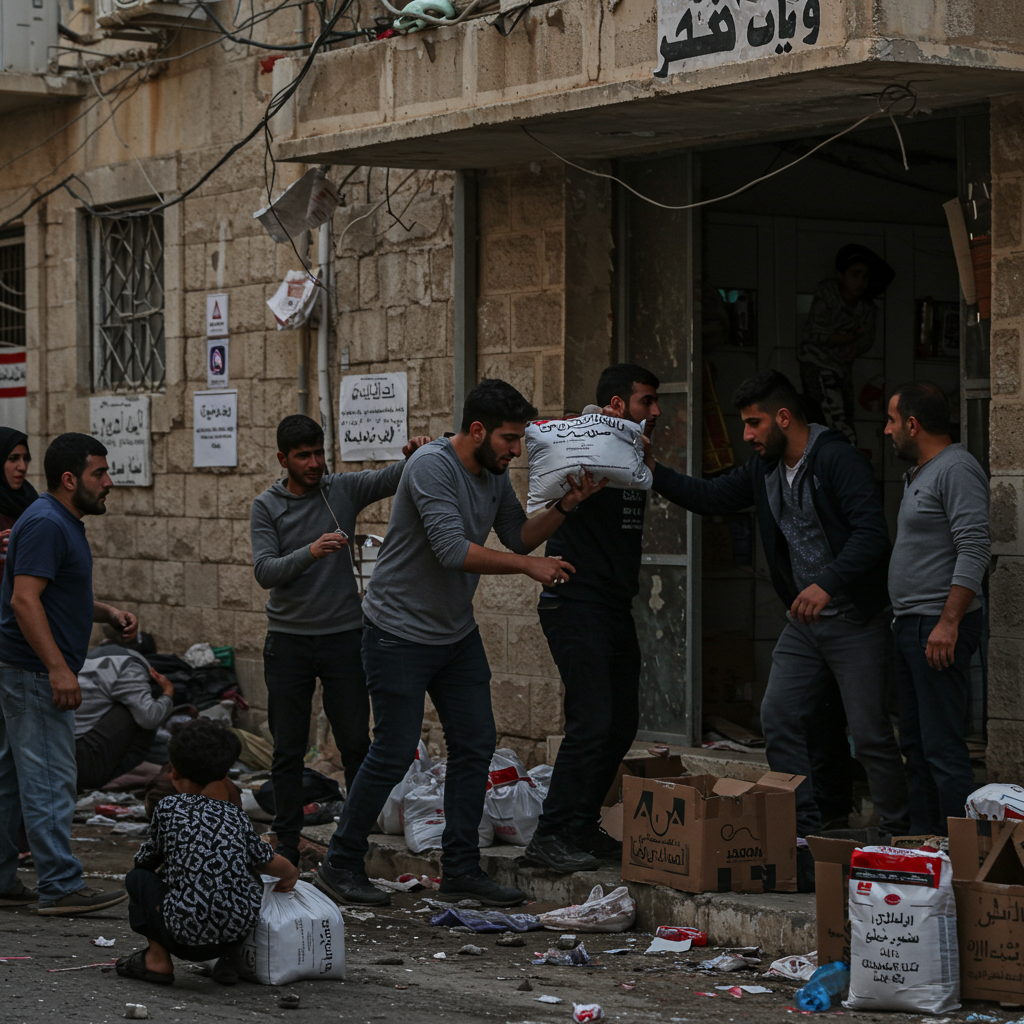A significant controversy has erupted in UK football, centering on the unexpected Maccabi Tel Aviv fan ban from an upcoming Europa League fixture against Aston Villa in Birmingham. This decision, citing severe safety concerns, has triggered immediate and forceful intervention from the UK government. They are pledging “everything in our power” to overturn the ban, emphasizing the critical principle that no fan should be excluded based solely on their identity. This incident spotlights the complex intersection of sport, security, and geopolitics, drawing varied reactions across the political spectrum and raising profound questions about public order at major events.
Why the Maccabi Tel Aviv Fan Ban Was Imposed
The contentious decision to prohibit Maccabi Tel Aviv supporters from attending the November 6th match at Villa Park originated from Birmingham’s Safety Advisory Group (SAG). This non-statutory body, which advises the city council on event safety certificates, acted on a “high risk” classification from West Midlands Police (WMP). Their assessment referenced “current intelligence and previous incidents” as the primary justification. Critically, WMP pointed to violent clashes involving Ajax and Maccabi Tel Aviv fans in Amsterdam in November 2023. This prior incident, resulting in over 60 arrests, was characterized by Amsterdam officials as a “toxic combination of antisemitism, hooliganism, and anger” fueled by the ongoing conflict in Gaza and the wider Middle East.
Birmingham City Council confirmed that police concerns about public safety were paramount. They indicated a collective decision was made to restrict away fans to mitigate potential risks. This move, while rooted in security assessments, has ignited a fierce debate about its necessity and proportionality, especially given the UK government’s strong opposition.
Unpacking the Amsterdam Flashpoint: A Precedent for Concern
The November 2023 incident in Amsterdam serves as a critical backdrop to the current Maccabi Tel Aviv fan ban. During that Europa League match, violent confrontations erupted between pro-Palestinian demonstrators and Maccabi Tel Aviv fans. Footage depicted fans pulling down a Palestinian flag, chanting anti-Arab slogans, and using inflammatory language. Police and prosecutors confirmed “antisemitic” rioters actively sought out Israeli supporters. The clashes led to multiple arrests and hospitalizations, with four men receiving short prison sentences. This event profoundly influenced the “high risk” classification for the Birmingham fixture, directly contributing to the SAG’s decision. Maccabi Tel Aviv’s subsequent European away game against Besiktas was even moved to Debrecen, Hungary, and played behind closed doors, underscoring the severity of these prior security challenges.
Government Vows to Overturn the Ban
In response to the ban, the UK government has launched an urgent campaign to ensure all fans can attend the Aston Villa match. Home Secretary Shabana Mahmood publicly declared the government is “doing everything in our power” to resolve the situation safely. She unequivocally stated, “Antisemitism is a stain on our society that shames us all,” emphasizing that “Every football fan, whoever they are, should be able to watch their team in safety.” A government spokesperson reinforced this, confirming active collaboration with policing and other partners to identify “additional resources and support.” The core message remains: “No one should be stopped from watching a football game simply because of who they are.”
Prime Minister Sir Keir Starmer also condemned the decision as “wrong.” He stressed that “we will not tolerate antisemitism on our streets,” affirming the police’s duty to guarantee fan safety without fear of violence. Culture, Media and Sport Secretary Lisa Nandy is actively meeting with officials, underscoring the high-level commitment to finding a resolution. The Home Office had been briefed on potential restrictions last week, leading to a political spat over how quickly officials were informed of the final ban. Conservative leader Kemi Badenoch criticized Home Secretary Mahmood’s department, suggesting inaction despite prior warnings, a claim Mahmood’s office vehemently denied.
Political Reactions and the Spectrum of Opinion
The Maccabi Tel Aviv fan ban has sharply divided political figures, revealing deep-seated tensions. While the government, Labour, Liberal Democrats, and Reform UK united in their condemnation, expressing concerns about antisemitism and the principle of fan inclusion, other voices offered contrasting views.
The Green Party, for example, publicly supported the ban. They labeled Starmer’s questioning of a local authority’s safety decision as “irresponsible,” linking the context to the ongoing conflict in Gaza and broader geopolitical issues. Ayoub Khan, an independent MP for Birmingham Perry Barr with a pro-Gaza platform, also welcomed the ban. He argued the decision was a “moral question” extending beyond mere public safety, suggesting that rules applied to Russian teams for actions in Ukraine should similarly apply to Israeli teams. Khan cited the Amsterdam violence as clear justification, even if additional police resources were provided. This stark division highlights the broader political implications now intertwined with sporting event security.
The Operational Independence vs. Political Will Debate
At the heart of this controversy lies the delicate balance between the operational independence of local safety bodies and the significant political pressure exerted by the government. Birmingham’s Safety Advisory Group (SAG) and West Midlands Police classify the match as “high risk” based on intelligence. Yet, the government insists on overturning this “operational decision,” citing fundamental principles of non-discrimination and the safety of all fans.
The UK Football Policing Unit, which advises on security, initially backed the ban. However, Simon Foster, West Midlands’ Police and Crime Commissioner, swiftly called for an “immediate review” by SAG and the police, questioning the appropriateness and proportionality of the measure. This signals internal disagreement even within policing structures. UEFA, European football’s governing body, while acknowledging local authorities’ responsibility for security, reiterated its desire for fans to travel and support their teams in a “safe, secure and welcoming environment,” effectively urging UK authorities to find a solution. The debate underscores the challenge of managing public order in an increasingly polarized global climate.
Voices from the Heart: Fans and Stakeholders React
Beyond the political and operational discussions, the Maccabi Tel Aviv fan ban has deeply impacted fans and club officials. Maccabi Tel Aviv CEO Jack Angelides expressed profound “dismay” at the decision, fearing it signals a rise in antisemitism. Andrew Fox, honorary president of Aston Villa’s Jewish Villans supporters’ club, described the ban as a “political message rather than a safety message.” He argued that Maccabi fans do not have a track record of violence and that established methods exist for managing opposing fans. Fox warned the decision sends a “really worrying message” and exacerbates an already “febrile political situation.”
Perhaps most poignantly, Emily Damari, a British-Israeli citizen and former hostage in Gaza, voiced her “shocked to my core with this outrageous decision.” A self-described “die-hard fan of Maccabi Tel Aviv,” Ms. Damari lamented, “Football is a way of bringing people together irrespective of their faith, colour or religion and this disgusting decision does the exact opposite.” These heartfelt reactions underscore the emotional toll and the perceived impact on community relations caused by the ban.
Geopolitics on the Pitch: A Wider Trend of Protests
The current Maccabi Tel Aviv fan ban is not an isolated incident. It is part of a growing trend where geopolitical conflicts, particularly the war in Gaza, spill over into sporting events. Throughout Europe, recent months have seen numerous protests impacting football and other sports involving Israeli teams.
Examples include:
Norway vs. Israel (Oslo): Earlier this month, 22 people were arrested near the Ullevaal Stadium during an Israel national team match, with tear gas reportedly used after demonstrators breached police barriers.
Italy vs. Israel (Udine): Days later, approximately 5,000 protesters marched ahead of Israel’s qualifier, leading to clashes with police and multiple arrests.
- Valencia vs. Hapoel Tel Aviv (Spain): A Euroleague basketball game saw several arrests during a protest.
- www.bbc.com
- www.bbc.com
- www.skysports.com
- www.independent.co.uk
- www.lbc.co.uk
These incidents highlight the escalating challenges for local authorities and event organizers in managing security for fixtures involving teams from countries embroiled in sensitive international conflicts. The call by some, including Spanish Prime Minister Pedro Sanchez and UN advisory experts, to suspend Israeli teams from international competitions further illustrates the politicization of sport in this context.
The Path Forward: Resolving the Europa League Standoff
The immediate focus now turns to a meeting of the Safety Advisory Group (SAG) expected next week. This group will review its decision, particularly if West Midlands Police alters its risk assessment for the match. The government remains actively engaged in “crunch talks” and exploring all available avenues to provide the “additional resources and support” necessary to allow all fans to attend safely. The ultimate goal is to enable the Europa League fixture to proceed as planned with a full complement of supporters, while upholding security and ensuring an inclusive environment. This ongoing dialogue represents a critical test for navigating complex security challenges within a highly politicized landscape.
Frequently Asked Questions
Why was the Maccabi Tel Aviv fan ban initially imposed for the Aston Villa match?
The Maccabi Tel Aviv fan ban was imposed due to severe safety concerns raised by West Midlands Police (WMP). They classified the Europa League fixture against Aston Villa as “high risk.” This assessment was largely based on “current intelligence and previous incidents,” specifically referencing violent clashes and hate crime offenses that occurred between Ajax and Maccabi Tel Aviv fans in Amsterdam in November 2023. Amsterdam city officials described that incident as a “toxic combination of antisemitism, hooliganism, and anger” related to the conflict in Gaza and the wider Middle East, leading Birmingham’s Safety Advisory Group (SAG) to prohibit visiting fans for the upcoming match.
Who are the key players involved in challenging the Maccabi Tel Aviv fan ban?
Several influential parties are actively challenging the Maccabi Tel Aviv fan ban. These include the UK government, with Home Secretary Shabana Mahmood and Culture Secretary Lisa Nandy pledging “everything in our power” to overturn it. Labour leader Sir Keir Starmer has also condemned the ban as “wrong.” Other critics include Conservative leader Kemi Badenoch, the Liberal Democrats, Reform UK, Israeli government officials, and key football stakeholders like Maccabi Tel Aviv CEO Jack Angelides and Aston Villa’s Jewish Villans supporters’ club. West Midlands’ Police and Crime Commissioner Simon Foster has also called for an “immediate review” of the decision by SAG and the police.
What are the broader implications of the Maccabi Tel Aviv fan ban for future sporting events?
The Maccabi Tel Aviv fan ban carries significant broader implications for future sporting events, particularly those involving teams from regions impacted by geopolitical conflicts. It highlights the increasing challenge for local authorities and event organizers to balance public safety with the principle of inclusive fan attendance. This incident sets a precedent where past conduct or geopolitical tensions can lead to widespread fan exclusions, potentially affecting other sports and teams. It also intensifies the debate around the operational independence of local safety groups versus political intervention, and whether sporting events should be insulated from, or are inherently reflective of, international affairs.
The government’s unwavering commitment to overturning the Maccabi Tel Aviv fan ban underscores the critical importance attached to upholding principles of inclusion and combating discrimination in sport. The outcome of this high-stakes situation will undoubtedly shape future policies on event security and fan attendance, not just in UK football but potentially across international sporting landscapes. It remains a stark reminder of how deeply global events can impact local communities and cherished traditions.




